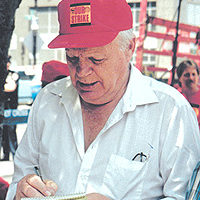CHICAGO – A coalition of neighborhood groups, civil rights, tenant and religious organizations has developed their own State of the City analysis demanding that the city council address problems ranging from lack of affordable housing to police brutality.
At a Feb. 21 meeting to launch the coalition’s campaign, “A Vision for Justice,” Jonathan Rothsein, a leader of the Jewish Council on Urban Affairs, said, “Mayor [Richard] Daley says he wants input from the community and we are more than willing to oblige.”
A newsletter described its goals: affordable housing, economic development, criminal justice, transportation and environmental justice and education.
“We selected these during a year-long series of discussions in different neighborhoods and communities,” Rosenthal said. The coalition is also emphasizeing community involvement in dealing with the city’s problems.
Rosenthal called particpants to make the program a “living document” and urged action to make the coalition’s goals “realities in the coming year.”
The meeting centered on presentations by coalition members elaborating on the demands. Maria Lugo discussed the need for steps to guarantee affordable housing. Pointing to the fact that, for the first time in half a century, more people are moving into the city than are moving out, Lugo charged that rising real estate values were pricing long-time residents out of their neighborhoods.
“When this happens, revitalization is no longer a blessing,” she said.
Lugo, a leader of the Brickdale Affordable Housing Committee, said the coalition demanded that all Chicagoans, regardless of race, religion, income or family status, “have a right to a safe, decent and accessible place to live. The city must commit to eliminating homelessness by assuring there are enough permanent housing units for people coming out of homelessness.” She said this means expansion of single room occupancy housing and increased funding for supportive housing program.
“The bottom-line cost to develop and maintain housing in Chicago exceeds the resources of families who earn less than $35,000 annually,” Lugo said. She said the situation was made worse by the fact that the Chicago Housing Authority’s “Transformation Plan” would result in a net loss of 13,000 units of public housing.
Lydia Taylor, executive director of the Justice Coalition of Greater Chicago, said that while safe streets are a “necessary condition” for healthier and friendlier neighborhoods, residents expect that law enforcement uphold the laws and that its personnel be responsible stewards of the public trust. “Unfortunately, the primary institutions comprising the criminal justice system – the police, courts and corrections – fall short of our expectations.”
Taylor said that people of color, the poor, immigrants, youth and the lesbian gay community have been unjustly targeted by the Chicago Police Department. She said this has resulted in “serious violations” of human, constitutional and civil rights as well a “injury, death and imprisonment of innocent men and women.”
Taylor said that in addition to these “violations of the public trust,” Chicago is faced with the problem of the more than 25,000 individuals, many of them younger people of color, who leave prison every year and are “inadequately prepared” to find a job, secure housing and “build a new life for themselves.” She called for the creation of a new system to provide these individuals with the skills, training and resources they need in order to succeed in rejoining their communities.
“Taken together, the need to reform the justice system and improving the transitional process from prison to society make the case for a complete overhaul of the criminal justice system,” Taylor said.
The coalition presented its demands to the city council Feb. 22.









Comments